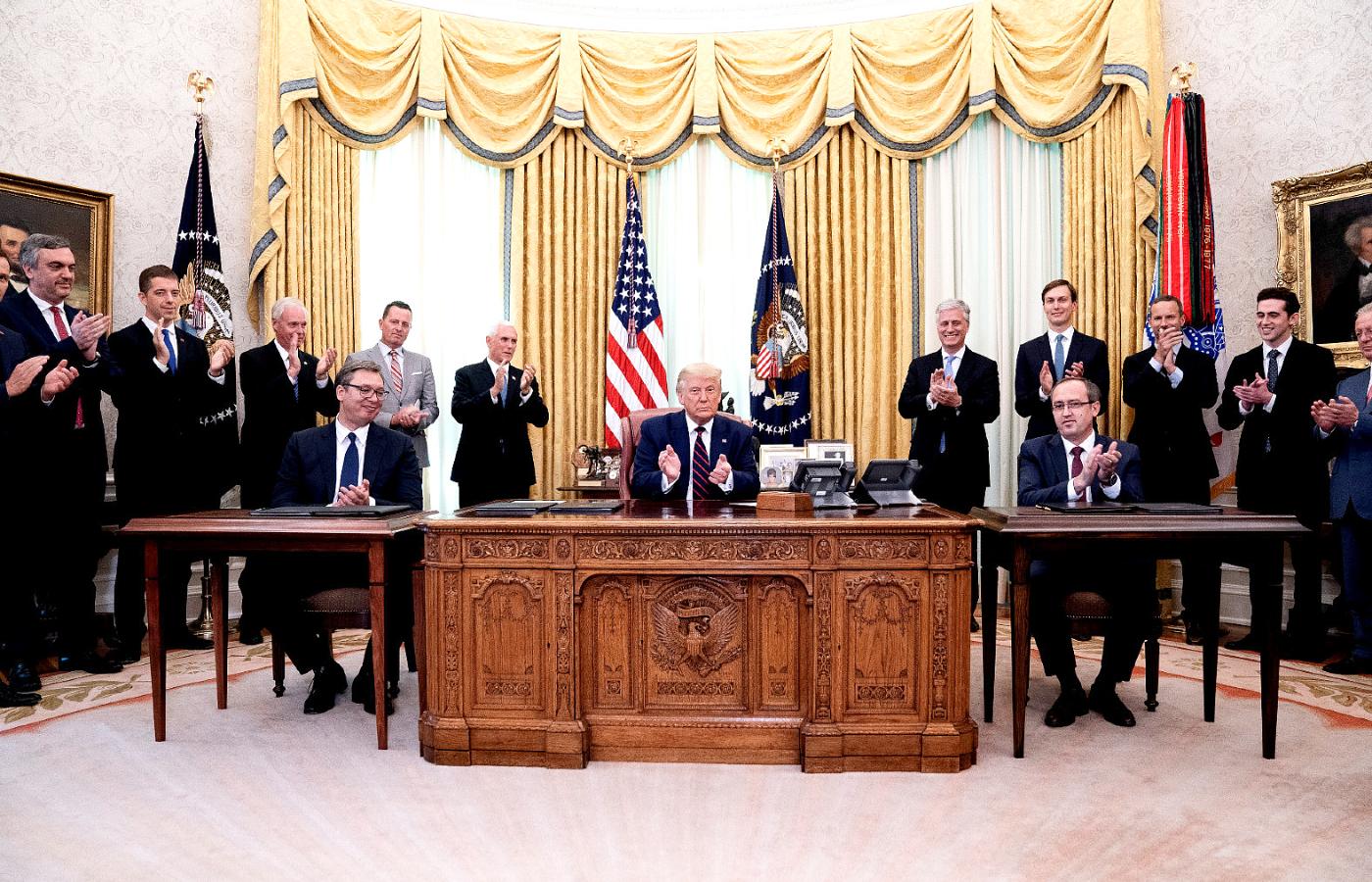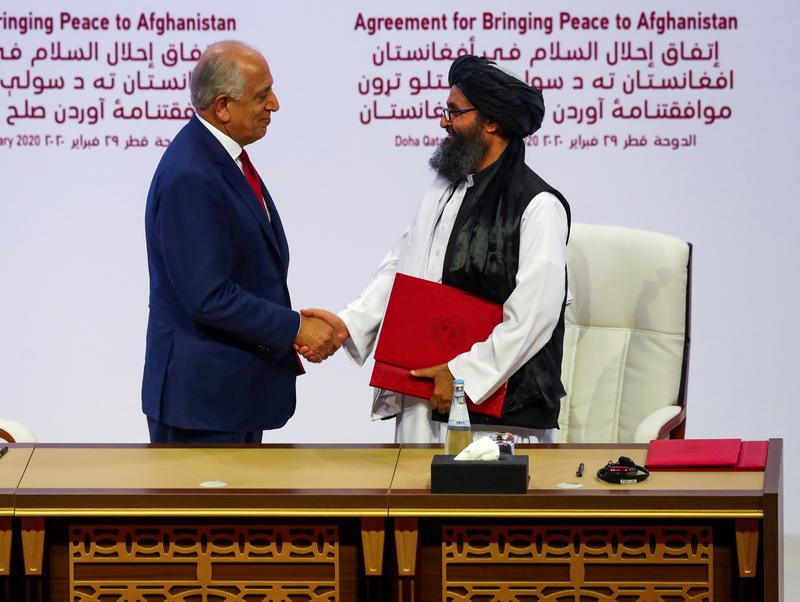
Donald Trump’s War and Peace
The document will be signed in Washington, D.C., because of Trump’s direct involvement in the peace deal. For Israel, recognition by another Arab country is beneficial, while the agreement brings no joy at all to Palestinians. But, despite all the ifs and buts, the agreement is an act of peace, not war. So, why not celebrate this with the Nobel Peace Prize? After all, awarding it to an intermediary peacemaker is a classic of the genre.
The media and communication around the initiative is more interesting than the nomination itself. An epic like Leo Tolstoy’s “War and Peace” is emerging in the U.S. and the rest of the world. The epic’s main theme is the American Army and what Trump, his supporters and opponents say about its various foreign operations and its role in the developing struggle over the future U.S. presidency. Such a situation is tense, verging on insanity.
It is known that, as a public speaker, Trump has ranged far from Joe Biden’s “eloquence” — he always says something wrong. However, allegedly calling American soldiers “losers” and “suckers” for being killed in action is too extreme even for Trump. Clearly, a gift from the Democrats, who conveniently reference anonymous sources, among other trademark tactics.
Then, however, a rather more genuine speech by Trump followed: He accused the military leaders of sending troops into combat to keep the defense contractors “happy.” Army Chief of Staff Gen. James McConville sternly and politely replied that war is always “a last resort” and the military leadership always considers it as such. Especially given the fact that many of the military leaders “have sons and daughters who have gone to combat or may be in combat right now.”
What can be deduced from this exchange of pleasantries? First, the military’s long-term dislike of the U.S. politicians who send them into all kinds of unwinnable wars. Second, Trump clearly positions himself as a peaceful president, rather than a warmonger. And, third, the mood of the Republican electorate is evident, first putting things in order at home before, once again, intimidating other nations.
In effect, Trump did not say anything new; he only briefly paraphrased the farewell address of one of his predecessors, Dwight Eisenhower, a general and hero of World War II, who had the moral right to say a few things about the military-industrial complex. On Jan. 17, 1961, handing over the presidency to John F. Kennedy and bidding farewell to Americans, he said … To be honest, the whole address has to be quoted and read. In the speech, Eisenhower channeled a lot of intelligent thoughts that are unexpectedly relevant today. Not even so much about the military-industrial complex, but about any powerful lobby that hires myriads of “experts” to impose ruthless decisions on the government. The key issue here is that an act of war is too serious a matter to be decided entirely by military leaders. It is the same with economics or medicine — the decisions cannot be made solely by doctors or economists, and so on.
Trump, of course, is no Eisenhower, but the entire Republican Party has become much friendlier with influential veteran organizations and pays tribute to the fallen. As such, it is not a coincidence that a hoax about “losers” and “suckers” has appeared.
It is also not coincidental that right now, on the eve of the November election, Trump has pledged to withdraw almost half (2,200) of military personnel from Iraq and 4,100 of 8,600 from Afghanistan. The announcement was accompanied by Trump’s words about the need to get America out of “endless wars.”
The withdrawal can undermine Trump’s relationship with politicians and military leaders but will hardly make him less popular with common soldiers. Because no rank-and-file soldier wants to continue fighting incomprehensible, stretched-out and endless wars in unpleasant locations, when the failure is obvious but withdrawing, up until now, has not been an option.
One cannot fail to note a special plot here, namely the possibility of a military coup in the U.S., or rather, a subtle conversation about it. Both reliable and untrustworthy sources have long written about the Transition Integrity Project to be carried out in January 2021. The project reflects the Democrats’ brainstorming on introducing street violence and terror as an expected outcome of the election, generating maximum confusion and fear over an “unfavorable” outcome. On par with street violence, organized military action appears extensively in these conversations. For example, due to dementia or not, Biden has already stated three times that the military will “escort Trump from the White House.” Two former Army officers, both prominent Biden supporters, wrote an open letter to the chairman of the Joint Chiefs of Staff in which they urged him to deploy the 82nd Airborne Division to remove Trump from the Oval Office at precisely 12:01 p.m., Jan. 20, 2021, an action supposedly supported by letters from all sorts of concerned citizens to the division’s commander.
Therefore, in the coming days, the U.S. military and its role in the presidential election and its aftermath in all forms will be discussed more often.
In conclusion, let us introduce an initiative to the Norwegian Nobel Committee: to award the peace prize to the president of the United States every year. Up front — as with the newly elected Barack Obama in 2009, seemingly for his beautiful speeches, but, in fact, to make him uncomfortable in continuing his warmongering. Let us also award the president a Nobel Peace Prize for the very fact that the U.S. did not invade anyone for a whole year. And because the U.S. is withdrawing troops from somewhere. And if this permanent laureate suddenly does not live up to expectations, the prize will be automatically revoked.
In any case, it will be a better use of money than awarding the prize by habitually alternating between a peacemaker and another “human rights activist” — that is, someone who most often provokes civil unrest in their own country, prompting foreign interference.


